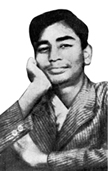Bhattacharya, Sukanta: Difference between revisions
(Content Updated.) |
No edit summary |
||
| Line 1: | Line 1: | ||
'''Bhattacharya, Sukanta''' (1926-1947) Marxist poet, was born on 15 August 1926 at his maternal uncle' | [[Image:BhattacharyaSukanta.jpg|thumb|right|400px|Sukanta Bhattacharya]] | ||
'''Bhattacharya, Sukanta''' (1926-1947) Marxist poet, was born on 15 August 1926 at his maternal uncle's home in Kolkata. His paternal home was in Kotalipara in [[Faridpur District|faridpur]] district. His father, Nibaranchandra Bhattacharya, was a book trader in Kolkata. | |||
Sukanta studied at Kamala Vidyamandir in Kolkata, and then at Beleghata Deshbandhu High School. He became involved in students' movements and leftist political activities while still a student. In 1944 he became a member of the Communist Party. He appeared at the Entrance examination in 1945, but failed to pass and dropped out. | |||
He edited the 'Kishore Sabha' section of the ''Dainik Swadhinata'' (1945), published by the Communist Party as well as a poetry anthology, ''Akal'' (1944), on behalf of the Society of Anti-Fascist Writers and Artists. | |||
As a poet as well as a Marxist he wielded his pen against the Second World War, the famine of 1943, fascist aggression, communal riots etc. Among his outstanding poetical works are ''Chhadpatra'' (1947), ''Purbabhas'' (1950), ''Mithekada'' (1951), ''Abhiyan'' (1953), ''Ghum Nei'' (1954), ''Hartal'' (1962), ''Gitiguchchha'' (1965). His complete writings were anthologised in ''Sukanta Samagra'' and published posthumously from both West and East Bengal. His poems, which describe the sufferings of the common people and their struggle for existence, look forward to an exploitation-free society. Sukanta died of tuberculosis in Kolkata on 13 May 1947. [Anik Mahmud] | |||
As a poet as well as a Marxist he wielded his pen against the Second World War, the famine of 1943, fascist aggression, communal riots etc. Among his outstanding poetical works are ''Chhadpatra'' (1947), ''Purbabhas'' (1950), ''Mithekada'' (1951), ''Abhiyan'' (1953), ''Ghum Nei'' (1954), ''Hartal'' (1962), ''Gitiguchchha'' (1965). His complete writings were anthologised in ''Sukanta Samagra'' and published posthumously from both West and East Bengal. His poems, which describe the sufferings of the common people and their struggle for existence, look forward to an exploitation-free society. Sukanta died of tuberculosis in Kolkata on 13 May 1947. [Anik Mahmud | |||
[[Category:Biography]] | [[Category:Biography]] | ||
[[bn:ভট্টাচার্য, | [[bn:ভট্টাচার্য, সুকান্ত]] | ||
Latest revision as of 15:23, 4 September 2021

Bhattacharya, Sukanta (1926-1947) Marxist poet, was born on 15 August 1926 at his maternal uncle's home in Kolkata. His paternal home was in Kotalipara in faridpur district. His father, Nibaranchandra Bhattacharya, was a book trader in Kolkata.
Sukanta studied at Kamala Vidyamandir in Kolkata, and then at Beleghata Deshbandhu High School. He became involved in students' movements and leftist political activities while still a student. In 1944 he became a member of the Communist Party. He appeared at the Entrance examination in 1945, but failed to pass and dropped out.
He edited the 'Kishore Sabha' section of the Dainik Swadhinata (1945), published by the Communist Party as well as a poetry anthology, Akal (1944), on behalf of the Society of Anti-Fascist Writers and Artists.
As a poet as well as a Marxist he wielded his pen against the Second World War, the famine of 1943, fascist aggression, communal riots etc. Among his outstanding poetical works are Chhadpatra (1947), Purbabhas (1950), Mithekada (1951), Abhiyan (1953), Ghum Nei (1954), Hartal (1962), Gitiguchchha (1965). His complete writings were anthologised in Sukanta Samagra and published posthumously from both West and East Bengal. His poems, which describe the sufferings of the common people and their struggle for existence, look forward to an exploitation-free society. Sukanta died of tuberculosis in Kolkata on 13 May 1947. [Anik Mahmud]
